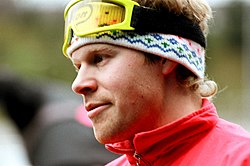Tomas Gustafson

Gustafson in 2010
|
||||||||||||||||||||||||||||||||||||||||
| Personal information | ||||||||||||||||||||||||||||||||||||||||
|---|---|---|---|---|---|---|---|---|---|---|---|---|---|---|---|---|---|---|---|---|---|---|---|---|---|---|---|---|---|---|---|---|---|---|---|---|---|---|---|---|
| Birth name | Sven Tomas Gustafson | |||||||||||||||||||||||||||||||||||||||
| Nationality | Swedish | |||||||||||||||||||||||||||||||||||||||
| Born |
28 December 1959 (age 57) Katrineholm, Sweden |
|||||||||||||||||||||||||||||||||||||||
| Height | 1.75 m (5 ft 9 in) | |||||||||||||||||||||||||||||||||||||||
| Weight | 70 kg (154 lb) | |||||||||||||||||||||||||||||||||||||||
| Spouse(s) | Elisabet Gustafson | |||||||||||||||||||||||||||||||||||||||
| Sport | ||||||||||||||||||||||||||||||||||||||||
| Country |
|
|||||||||||||||||||||||||||||||||||||||
| Sport | Speed skating | |||||||||||||||||||||||||||||||||||||||
| Turned pro | 1979 | |||||||||||||||||||||||||||||||||||||||
| Retired | 1992 | |||||||||||||||||||||||||||||||||||||||
| Achievements and titles | ||||||||||||||||||||||||||||||||||||||||
| Personal best(s) | 500 m: 38.10 (1990) 1000 m: 1:18.48 (1981) 1500 m: 1:53.22 (1990) 3000 m: 4:03.17 (1987) 5000 m: 6:44.51 (1987) 10 000 m: 13:48.20 (1988) |
|||||||||||||||||||||||||||||||||||||||
|
Medal record
|
||||||||||||||||||||||||||||||||||||||||
Sven Tomas Gustafson (born 28 December 1959) is a retired Swedish speed skater, and one of the most successful distance skaters of the 1980s.
Born in Katrineholm, he won the World Junior Championships title, in Grenoble, France, in 1979. One year later, at the European Championships of seniors, he finished 4th. One month after that, he participated in the 1980 Winter Olympics at Lake Placid, New York, with a 7th place on the 1500 m as his best performance. In that same month, he defended his Junior World title.
In 1982, he became allround European Champion in Oslo, where he set the 10,000 m world record. As of 2017[update] this is the last outdoor World record for men on a lowland track. Because of this performance, he was awarded the Oscar Mathisen Award, an award for the best skating performance of the season. One year later, on the same track, he won silver at the World Allround Championships, finishing second behind Rolf Falk-Larssen. Gustafson had the best allround point-sum (samalog), but Falk-Larssen won by the rule that a skater winning three distances, and merely having finished the fourth, is automatically pronounced the champion. This caused a renewed debate about the three-distance-wins rule which was subsequently abolished. From 1984 onwards, the champion was to be the skater with the best allround point-sum.
One year later, his focus was not on the world allround championships, but on the 1984 Winter Olympics at Sarajevo. He won Olympic gold in the 5,000 m, ahead of Soviet skater Igor Malkov by a mere two hundredths of a second. In the 10,000 m, he once more found himself again in a close finish with Malkov, this time losing by five hundredths of a second. After these Olympics, Gustafson struggled through a knee surgery, meningitis, and the death of his father.
...
Wikipedia
